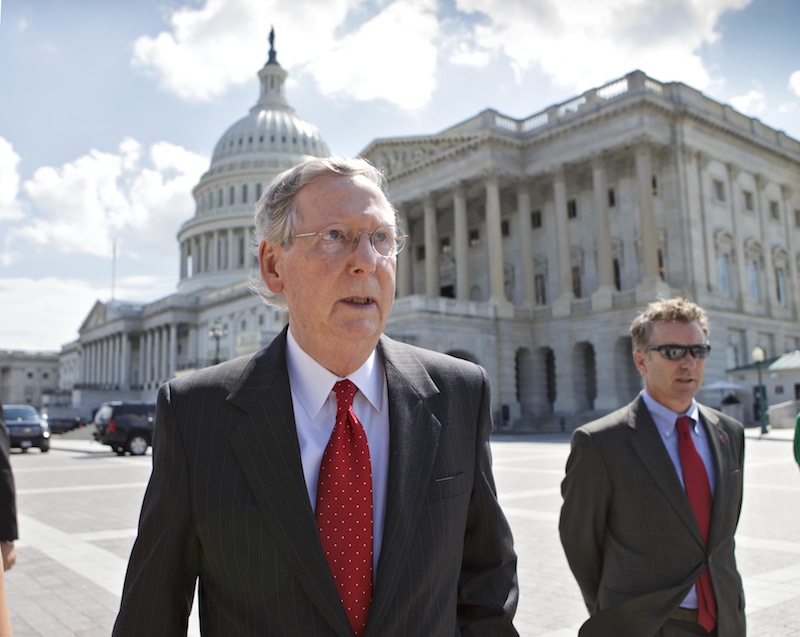Perhaps nobody was more responsible for making Obamacare a partisan bill than Mitch McConnell. During the grueling debate that began in 2009, the Senate minority leader worked diligently to ensure no Republican voted for health care reform.
It wasn’t just moderates like Maine’s Olympia Snowe, who voted for the bill in committee, who wanted to play ball with the new president. It was conservatives like Iowa’s Chuck Grassley, who endorsed the dreaded individual mandate that June, and Utah’s Bob Bennett, who cosponsored a bill that year with an individual mandate. The White House and top Democrats spent months trying to win GOP votes, offering senators all sorts of enticements, but failed to overcome McConnell’s whip operation. That solidified the unanimous GOP opposition in the House, where the party had been reduced to a largely irrelevant — and deeply conservative — rump.
“We worked very hard to keep our fingerprints off of these proposals,” McConnell told The Atlantic. “Because we thought — correctly, I think — that the only way the American people would know that a great debate was going on was if the measures were not bipartisan. When you hang the ‘bipartisan’ tag on something, the perception is that differences have been worked out, and there’s a broad agreement that that’s the way forward.”
He also saw the value in campaigning against a partisan expansion of the safety net. The strategy worked wonders in 2010 when the conservative uproar against Obamacare — fueled by McConnell’s scorched-earth strategy — gave Republicans huge victories in Congress. But things changed, and the political calculus altered.
The law was upheld by the Supreme Court and validated by the re-election of President Barack Obama. The public has grown tired of continual budget crisis brinkmanship. McConnell still fights the fight. Obamacare, he told his constituents a few weeks ago, is the “single worst piece of legislation passed in the last 50 years in the country.” But ever the pragmatist, he knows an all-out assault on the Affordable Care Act to the exclusion of other political considerations would be a disaster for his party. And so, in a cruel irony reminiscent of Mary Shelley’s novel “Frankenstein,” the monster McConnell created has turned against him and is threatening to end his political life.
The Kentuckian is now fending off a strong conservative challenger for re-election in 2014 — his first since Obamacare became law. The candidate, Louisville businessman Matt Bevin, is calling on McConnell to back up his fiery rhetoric against Obamacare by threatening to shut down the government at the end of this month unless Democrats agree to defund it. McConnell knows that strategy is doomed to fail and would imperil the GOP’s hopes of winning the Senate majority. “Shutting down the government,” he explained, “won’t stop Obamacare.”
But Bevin has the backing of conservatives who are deeply committed to destroying Obamacare ahead of its Jan. 1 rollout and are demanding McConnell’s fealty. It defies logic to them that Republicans aren’t willing to temporarily shut down national parks and museums in an effort to thwart a law they insist is so destructive to the fabric of American society. “I truly believe he would blink on this,” Bevin said Thursday on MSNBC, insisting that Obama would be willing to neuter his own signature achievement. “I really do.”
As punishment for resisting their Obamacare shutdown push, conservatives have likened McConnell to a “chicken“; they’ve released web videos attacking him for failing to lead; they’ve argued that he “owns” Obamacare if he allows it to be funded. On Thursday the Senate Conservatives Fund, after launching a statewide campaign to make him “feel the heat” on Obamacare, announced a TV ad buy worth $340,000 attacking him.
“McConnell is the Senate Republican leader but he refuses to lead on defunding Obamacare,” a narrator in the ad says. “What good is a leader like that?”
It’s far from clear conservatives will be able to defeat the well-funded incumbent. But if they succeed, McConnell will, in a way, have given life to the creature that brought about his own demise. Obamacare could have been a controversial but bipartisan expansion of the safety net, like Medicare and Social Security — the law was, after all, modeled on conservative ideas constructed by the Heritage Foundation and first implemented by Mitt Romney. The right-wing furor would have been less severe, the GOP less motivated to paint the law as an existential threat to freedom, and the party likelier to make its peace with it. But the GOP leader’s big gamble to co-opt the nascent tea party movement precluded that scenario. And as a result, the health care law has become an existential threat to his career.






